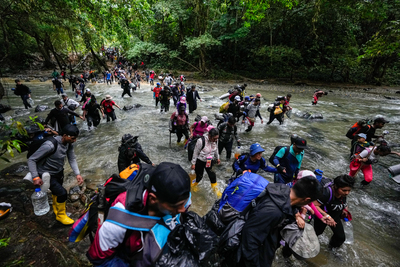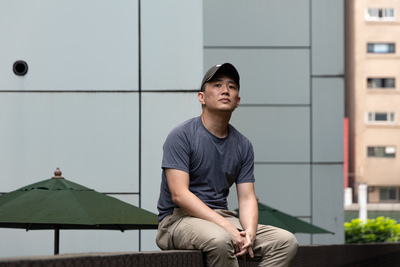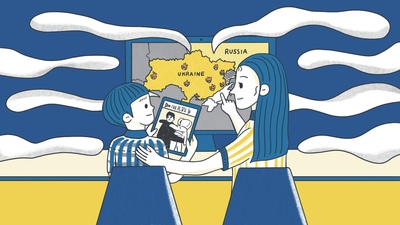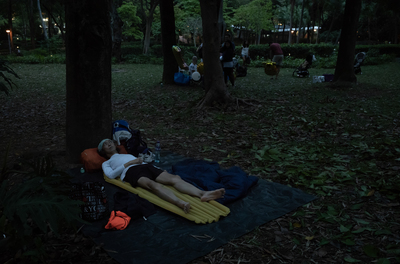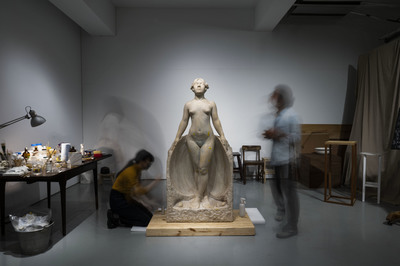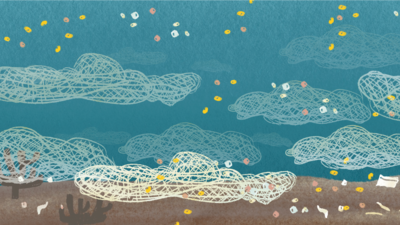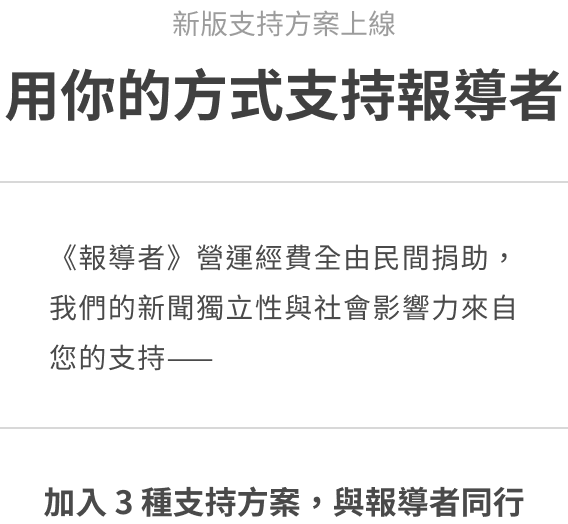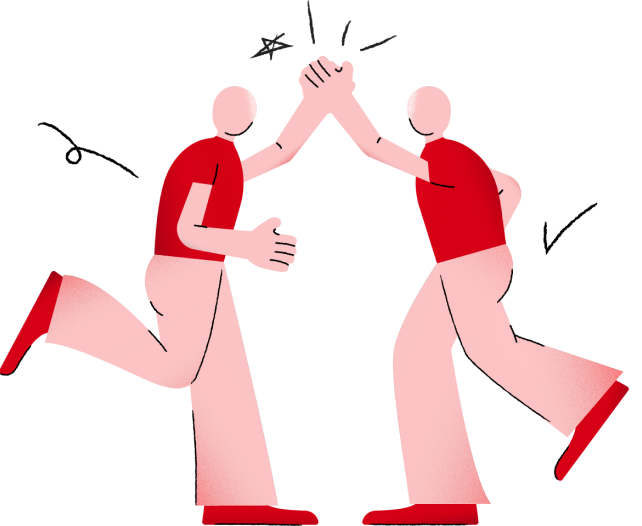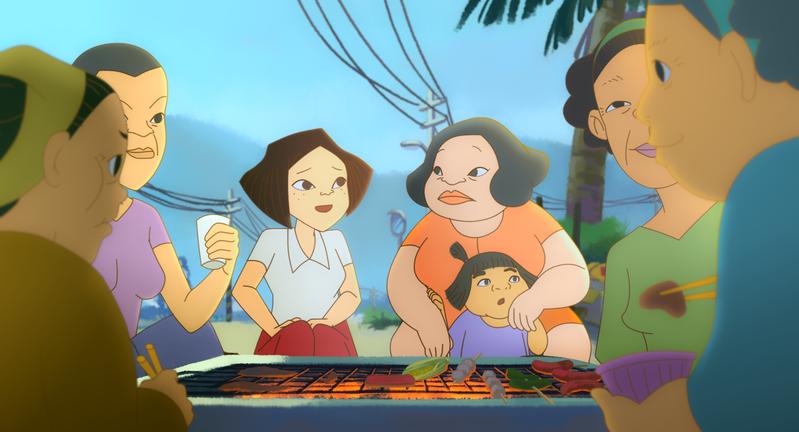
In this special discussion, five authors talk about the impact of “On Happiness Road” and its ability to transport viewers to another era.
The animated film On Happiness Road (幸福路上) has been called a milestone in Taiwanese animated film. Set in the 1970s, the story spans 30 years of Taiwanese history and depicts historical events through the lens of a personal narrative. It touches on themes close to the hearts of different generations in Taiwan and leads viewers to reflect on the choices they have made in their own lives.
Life in Taiwan was quite different between the ‘60s and ‘80s; the Taiwanese Hoklo language was prohibited and Chiang Kai-shek’s (蔣介石) cult of personality was very much alive. In what ways were the feelings, experiences, and imaginations of the Taiwanese people different? In this new era, how can Taiwanese put those forgotten memories back together?
Below are excerpts from a panel conducted jointly by Rive Gauche Publishing, Acropolish Publishing, and Gusa Publishing; the Reporter was given permission to reprint the discussion, and is edited for brevity by the translator.
Chen Tsui-lien (陳翠蓮) History professor at National Taiwan University Author of Reconstructing 228 (重構二二八)
I often hear friends say that Taiwan doesn’t care about its own history or culture, and that we don’t tell our own history in our stories. The director of this animated film tried to do exactly that. I don’t think I’m the only one who sees this as a very political film, which is a first for Taiwan. Because of this, everyone should go see it.
Director Sung Hsin-yin (宋欣穎) was born the same day President Chiang Kai-shek died, and the film’s depiction of the environment she grew up in, for example her schools and entrance examinations, is surprisingly similar to how I remember it despite our age gap of ten years. From the start, her dad told her that she would starve studying philosophy. When I was young I wanted to draw, and my dad would also say: do you want to starve? I was born on November 24. Does that date sound familiar? The school textbooks from the time said that the Revive China Society (興中會) — a predecessor to the KMT — was founded on that day and that it was the beginning of the great rejuvenation of the Chinese nation. When I found out about this I felt a little bit like I had been chosen by the gods, to be born on the same day as this great Party. The education of the time showered us with this kind of thinking.
Because the protagonist of the film Chi (小琪) wanted to study the humanities, she had to rebel against her family. Many people back then were like that: they were their parents’ greatest hopes. I wanted to study political science, and my mother was scared to death that I would become a political criminal.
I was in school even earlier than Chi, when society was even more strictly controlled. In the film, textbooks told the fable of Chiang watching fish swim up the river; when I was in first grade, we sang anti-Communist and national rejuvenation songs in the morning assembly. I went to a school in the outskirts of Taipei in Shulin, and the children would sing in the morning: “fight the Communists, fight the Communists, go to the Mainland to fight the Communists."
When we talked about the president or the founding father, we had to sit up straight; those from the ‘50s will remember this era of even more intense rules. This part of the movie resonated with me, especially the part where we made fun of our parents’ “low class dialect” after learning Mandarin and “high culture.”
When I was small I could already speak pretty standard Mandarin, and when I was sent to speech competitions I always felt so proud of myself. When people said, “Chen Tsui-lien you must be a mainlander,” I also felt proud, as if my blood had been washed clean.
A friend of mine, born in the ‘40s, tells me this film also describes how she grew up. Those born from the ‘40s to ‘70s all pretty much grew up in the same way. We see from the film that from the beginning to the end of martial law, Taiwanese society did not change very much. In fact my child entered high school recently and I found that the content of their literature textbooks is pretty much the same as when I was in middle school. This is actually very scary.
The issues discussed in this film are not just the problems of a particular generation, but a problem facing all of Taiwanese society today. It is an animation that crosses generations. Hayao Miyazaki’s movies are watched by young and old, and each generation sees different things. This animation is just like that: when people watch with their parents, each sees a different facet.
Because I studied political science, the political aspects of this film stood out to me. One key point of the film is how, for a very long time, the people living on Taiwan were de-emphasized or even alienated by the occupying society or country.
The importance of education should have been to teach individuals to discover themselves, to enlighten and search, but the education that we saw did not allow for students to ask: who am I? What kind of person am I? What kind of adult do I want to be? They never taught these things, and it is still like this today.
Those in the government think that education is a tool to implement their standards; that there is a way that the people should be. Education becomes estranged; it becomes a tool to make money, a tool to make a living. Reading books just becomes a way to find a job. It is still like this; we want universities to cut the humanities because students have to find jobs when they leave, and becoming a doctor is still the top aspiration. It’s probably not this bad anywhere else in the world. When education is estranged, the focus is no longer on people.
For example, when characters in the film become interested in themselves and their ethnicity and investigate the history of their island, they become enemies of the rulers and are arrested. The film satirically calls Taiwan a “kingdom that does not read books.” In this kingdom, people who read books like Ah-wen (阿文) become a thorn in the eye of the rulers.
What kind of country should we be? What are the national ideas to which we aspire? These were not important questions for the authorities. An important part of the film touches on how everyone wanted to leave for America and it really was exactly like this. When I was in high school, when the situation in Taiwan was at its most dangerous, my classmates who had good family backgrounds all chose to emigrate, to escape this place, to become Americans, Canadians, Australians, or South Africans.
Taiwan is a drifting island. The saddest part of the film for me is that Ah-wen also went to America. Those with the economic ability left Taiwan; it’s as if this has always been Taiwan’s fate, to be a city of sadness. In the past it was to leave for America, and now there might be another goal.
In such a situation, how can people have any kind of hopes for life in Taiwan? Any kind of dream? Even though people work hard, in the end, what makes them happy? The grandmother’s saying that “having food to eat is happiness” feels pessimistic; it is a vicious circle for society. In the film, the protagonist Chi challenges this phenomenon, and ends up with a lot of questions.
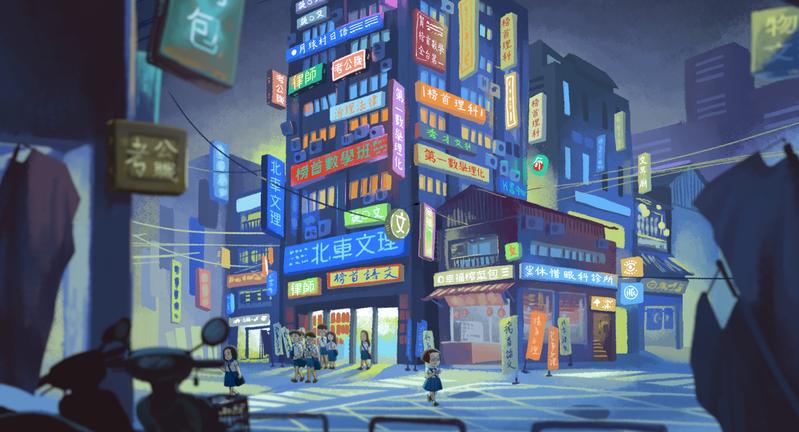
Wu Jieh-min (吳介民) Assistant researcher at Academia Sinica Author of The Third Imagining of China (第三種中國想像)
There was a period of my life when I was considered a low class vagrant. I never lived in Xinzhuang, where the film is set, but I lived in Sanchong, another satellite district of Taipei City. In places like Xinzhuang and Sanchong, there were small factories everywhere.
I was born in the ‘60s, and in those times, Sanchong, Xinzhuang and Luzhou were completely different than how they are today. I didn’t live on Happiness Road, but I felt a familiarity with the characters and the world depicted in the film. Even though I’m a generation older than Chi, this film still had a kind of magical power to allow me to sink into reflection, to reflect on how I came to be where I am today. Since elements in the film were so close to my own background, it took me back to the era that I grew up in.
Chi’s family consists of labourers, and labourers had only two roads they could take in society. Today these two roads are even narrower, but back then there was still a chance: one was to work hard in the lower class and go from gangster to boss. In the film there is a character who saves up money and starts his own auto repair shop, slowly moving upwards until he could become a small business owner. After working hard for five years, he had enough to pay the down payment for a unit in the “Ph. D. Homes” apartment complex in Xinzhuang. But today, this would be impossible.
The other road was through standardized exams, with the hope that one’s child could somehow improve the family’s situation. What did Chi’s parents want her to study? We are so used to hearing this kind of story: they wanted her to be a doctor. What school was it that Chi was admitted to, when all her neighbours came over to congratulate her? Of course it was Taipei First Girls’ High School (北一女), the best girls’ school in the country.
This wasn’t about admittance to National Taiwan University, the country’s best university, this was just about Taipei First Girls’. Even that was something to set off firecrackers for.
When I saw it I was very moved and became lost in thought about its connection to my own life. The first remarkable thing about this film is that it made me think about these questions. Hollywood movies don’t make you think, they only make you cry. But the best works of art and literature are the ones that ask questions.
The introduction of our current discussion posed the question of whether this is a film about our country’s people and whether it can be interpreted from a political perspective. To me, this is too much. But it is also too narrow to view the film merely as a biography or the director’s personal life story. So, my compromise is that the film achieved at least one thing, which is that it let us relive a period of Taiwan’s history. It is a story of two generations that every parent has experienced. Of course the film actually covers three generations, but the grandmother’s story is more in the background and is dealt with more abstractly.
From the point of view of my research as a sociologist, the film is about the “economic miracle” period of Taiwan’s history, and not the era before it.
Taiwan had thirty years of rapid economic growth at almost 10 percent GDP growth per year, which is as fast as China is growing today. This era, between the ‘60s and the ‘80s, has already passed in Taiwan, and Chi was born in 1975, so she mostly lived after this era.
We now live in the “post economic miracle” period. In the fifteen years after the economic miracle, with enough hard work and enough luck, a person could lift their social status, make money, become rich, and go from being a gangster to a business owner. However, after economic growth became saturated, opportunities became fewer and competition became even more fierce. As a result, the contradictions between interpersonal competition and societal structure became more serious. Similarly in China, the accumulated contradictions in society have become even greater than they were twenty or thirty years ago.
Chi and her friends lived through this period. They played together, they were forced to stand in punishment together by their teachers, and attended cram sessions together after class. My teacher was just like the one in the film; exam questions would be revealed during the cram session and if you didn’t attend, your grades would suffer.
I thought it was just too apt that Sheng-en’s (聖恩) father raises pigeons for a living in the film. Back then, Taiwanese were crazy about betting on pigeon races; it was a way to get rich (or lose everything). I raised pigeons too when I was young, but after awhile I just let them go.
I thought this film had a strong class consciousness, which is really rare for Taiwanese films. It has been there in Taiwanese literature, but not so much in films. I think of the film as a fable on class mobility which belongs entirely to Taiwan. It’s really so very Taiwanese, the visual details and story are really very Taiwanese, and its flavour is that of a lower class satellite city of Taipei.
Chi’s grandmother is Amis, and she played two roles in her life. Sometimes when Chi felt unhappy, she would provide a fix: there was one time when she drew a tattoo on her as a sort of therapy. She also played the role of a spiritual teacher. Her grandmother said many times that as long as people have food to eat, they are happy; as long as you can cook, and cook well, then things are alright. When Chi mulled her return to Taiwan she said, “I don’t know how to do anything.” But according to her grandmother, if you have enough to eat then you have happiness.
This saying was also spoken by other characters. Could it be a way for those on the lowest rung of Taiwanese society to humorously accept their fates, a sort of philosophy for lower class living? Or is it a stereotype that Taiwanese have of themselves? I think it’s worth thinking about.
The part of the film where Chi decides to return to Taiwan, I thought of another literary work. Has anyone read Night Freight (夜行貨車) by Chen Ying-chen (陳映真)? Having suffered enough, the male and female protagonists decide to return to their hometown, but this doesn’t solve their problems. Likewise, Chi returns to Taiwan to be together with her parents again, but the problems only start from there. Her parents are growing older, and Chi is already forty years old. What will she do to care for her aging parents? This is a very relevant problem for today’s young generation.
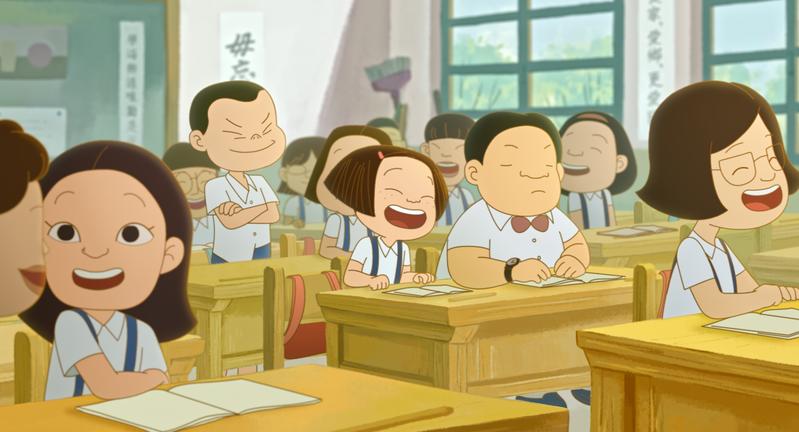
Sherry Lee (李雪莉) Editor-in-chief of The Reporter Author of Fishing Ground of Blood and Tears (血淚漁場)
The two scholars who just spoke shared quite a lot, and gave some very deep and academic analysis, which is what I was most afraid of. How can I talk about my view of the film now? When I watched the film, I felt that I was very similar to Chi. Even though I didn’t live in a satellite city, I think a lot of people had similar backgrounds: I was not rich, but I still lived in Taipei when I was young.
Those born in the ‘70s lived through an awkward time, and this is the first film which gives voice to that generation. We didn’t lead in the storm of student movements in the ‘80s where, for example, many of our panelists’ classmates came to power. We also grew up in a time before the internet era, and those who grew up in that era lack our sense of burden.
I was born in 1975, and I remember on the day that martial law was lifted my father said to me, “finally, now we can actually speak.” In my thirteen years of life we had no way of actually “speaking.” If one spoke carelessly, the police could check our household registration cards. My second point is that in the past Taiwan has had many films, for example Girlfriend Boyfriend (女朋友男朋友), whose political narratives were very rigidly male. Even when they depicted the Wild Lily student movement, it was from a male viewpoint. On the other hand, On Happiness Road is a film which comes from a female perspective. Edward Yang’s Taipei Story (青梅竹馬) and A Brighter Summer Day (牯嶺街少年殺人事件) are metaphors of sorts for the politics of the time, but in an understated way. Sylvia Chang’s 20 30 40 comes from a female perspective, but it is not a political film.
As the film has a female perspective, it tends to emphasize relationships. I won’t give spoilers, but for example, among them are Chi’s relationship with her grandmother, her friends, and her neighbours who were Mainlanders with a military background. This may seem like a minor point, but it expresses a kind honesty and womanly concern. It is not a heroic action film, and some people were disappointed by the lack of big dramatic scenes and felt that it wasn’t entertaining. But it is a film that sees Taiwan from a female point of view with a cast of very three-dimensional supporting characters, and expresses a warmth toward people.
My third point is that the animation industry in Taiwan has always been doing subcontractor work for Japanese and American companies. Other than rare exceptions such as Grandma and Her Ghosts (魔法阿嬤), there have not been examples of Taiwanese telling their own stories in this medium. On Happiness Road is a complex story that spans 30 years and moves between the past and present in a way similar to Satoshi Kon’s Millennium Actress.
I saw on Facebook a director saying that if On Happiness Road was shot as a live-action film, it definitely would have earned more than 10 million NTD (3 million USD). But how expensive would that have been? In the current situation, where Taiwanese cultural industries face pressure from China, it’s already hard enough to secure resources for this kind of work. In that sense, it’s a milestone. It is a work of art with deep values, but I’m a little worried about its box office sales. The film really has a lot of historical significance.
Those of us born in 1975 are used to big panoramic narratives of happiness. We are used to uppercase Happiness, whose foundations lay in the “nation”: that is, to smash the Communists is to be happy. But when this notion was shattered and Taiwan slowly became more diverse and messy, we began to chase a lowercase happiness. Compared to before, this kind of happiness isn’t one that can be achieved purely from hard work and economic growth. The economy was actually very weak in the years immediately after our youth.
Without a predetermined track, we began to ponder what the purpose of life was. We searched for this lowercase happiness and wondered why it was so difficult to find. In the last class I attended at National Taiwan University, I finally realized how confused we were.
This is a serious issue for those born in the ‘80s and ‘90s, especially those who studied in the humanities since they’ve encountered difficulty finding jobs. Further, people born in the ‘80s and ‘90s believe that today’s Taiwan is diverse and that diverse values will naturally develop, but this development in the last thirty years has been slow and hasn’t met our expectations. In some areas things have become more like they were before, for example with vocational schools. From industry to government, there is more and more emphasis on a single value - see how the labor law has been amended, for example. I don’t understand it at all.
This film is a call to memory for those born in the ‘60s and ‘70s, a story describing their childhoods. For those born in the next decades, they may feel confused that diversity has still not been achieved in Taiwan. This is an impression I hold deeply.
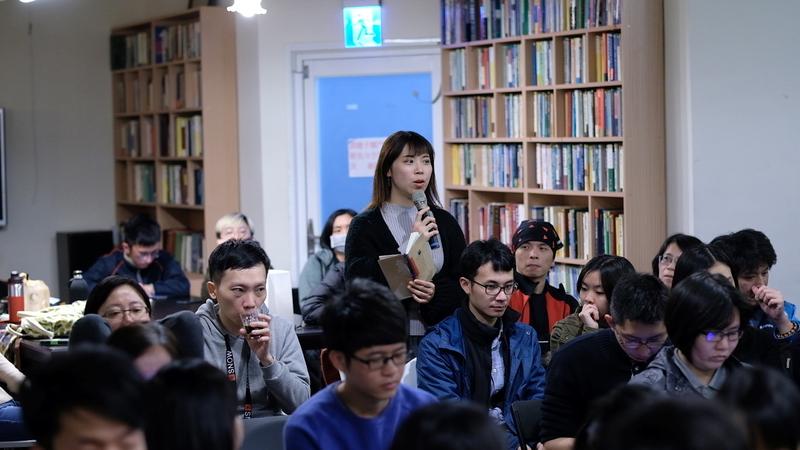
Lin Li-ching (林立青) Novelist Author of Working Man (做工的人)
I feel like the pressure is on now, since the last few speakers said a lot of interesting things about our national consciousness. I had just taken my mom to see the film this afternoon. She’s an archetypical mom, just like Chi’s, and after she saw the film she told me to hurry up and get married, see how happy married people are. She said, your mother loves you, so why don’t you have a kid to love too. It’s a good film to see with family; they’ll be in a good mood to blackmail you and you’ll have some interesting interactions and discussions afterwards.
As soon as we walked out of the theatre, my mom said the beginning was similar to Sanyo Whisbih (三洋維士比)—a mildly alcoholic Taiwanese energy drink—and the end was like Paolyta-B (保力達B)—a stronger alcoholic Taiwanese energy drink. Working class people like us often compare things to advertisements. It was only in the past two years, since I became an author, that I would go to the movies with people. In the past we would only see one every year, and the whole family would go on a special occasion.
The characters Chi and Sheng-en in the film each symbolize different tendencies and ways of living. Regarding class mobility, someone already discussed entrepreneurship as one method, and scholarship, testing and the civil service is another. But there is another way, the oldest in the book, which the movie also shows: marriage. The three friends had their own way. I never saw my friends who got into Taipei First Girls’ again. Even now, I still can’t find them.
The grandmother has a saying: “if you have food to eat then everything is fine.” That is, be content with what you have. But the father and mother have a different definition of happiness. They want Chi to be more accomplished than they are. The grandparents’ generation already feels that their children have surpassed them in accomplishments, and the parents’ generation feels the same way about Chi. But as I realized in the last few months, just going to Taipei First Girls’ doesn’t guarantee a lifetime of success, and the film shows the same thing. Chi is still hesitant in life, and after her fight with the system she doesn’t know what she wants to do.
People like me also don’t know what they want to do, but I’m lucky in that I’m stuck between these two generations. As Chi’s worldview widens she only becomes more confused and hesitant. She leaves the country, finds a job and gets married. This is something we have always felt pressure to do. And we see all kinds of strange pressures and fantasies constantly being thrown at today’s youth, if not from their parents then from the people around them.
This film was very ambitious. For a Taiwanese animation to be good, it has to have a good plot and it has to move people. It was at least able to incorporate the grandmother’s indigenous heritage and her betel nut eating habits, which were a source of cultural conflict in the film. My father, like Chi’s, had also hurt his foot, and I remember talking to my mother quietly in front of the TV. I said that he would definitely lose his job, and my mom said that Taiwanese bosses were all like that, horrible people.
That raises the question: did Chi’s father really choose to retire, or was he forced to do so? When Chi confronted her father she did not understand this, and her father did not want them to know. Afterwards, they would pick up trash and recycle for money, and that really touched me. I’ve learned from working in construction what kind of recyclable metals were good to sell. I’ve always been a labourer; even now I don’t visit coffee shops like this one. I’m still learning how to come to places like this.
The director has already discussed the issue of nationality. In one scene, Chi’s father says she is about to be born and at the same time, Chiang Kai-shek passes away. My mom said to me that in those times you would have to kneel. To me, when people die they just die, but when my mom was in school the kids would kneel in rows. Graduation ceremonies were cancelled the year Chiang died, and then again when his son, Chiang Ching-kuo (蔣經國) died.
Nowadays gangsters can’t become businessmen anymore. Is the notion of old money and legacy still around? We can openly discuss indigenous issues on television and even discuss the ethnic origins of people from South-east Asia. I won’t reveal more about the story, but I want to encourage everyone to take their families to see this film, and also read my book, Working Man, alongside it.
Chu You-hsin (朱宥勳) Novelist and columnist Author of The Books They Don’t Dare to Teach in School (學校裡面不敢教的小說)
I was born in January in 1988. Last year there was an event in remembrance of martial law from the perspective of three different generations, and I was invited. I told them that my memories would consist entirely of sleeping in the hospital nursery (Taiwan’s martial law period ended in 1988).
I study literature, so I’ve developed a good sense of narrative time. Chi was born in 1975, so when martial law was lifted she had just entered middle school and was probably 12 years old. The film emphasizes that she was born the day that Chiang Kai-shek died. This has symbolic meaning: when this generation of Taiwanese think about the lives they want to live and about happiness, the starting point is the death of this “great man.” Before he died, there was no use in even thinking about it. For the next twelve years before she entered middle school, Chi was very naive and cute. Entering middle school was the dividing line between this carefree Chi and the confused Chi. This dividing line coincides with the end of martial law.
There are two main events that happened on Taiwan in the 20th century. The first is in 1945, when the Japanese colonial government was replaced by the Kuomintang. The second main event is the end of martial law, when the idea of what it means to be Taiwanese and where we wanted to go were re-evaluated. I don’t know what the director thought about when she wrote the film, but I think this is an accurate and interesting set-up. Based on social views, the generation of people who are 40 right now form another kind of dividing line. For example, most people older than 40 oppose same-sex marriage, but people younger approve. In this way, the film is very timely, since the people who were born after the end of martial law are now old enough to look back and think about how they grew up. In recent years I’ve felt that a lot of works, for example Our Times (我的少女時代), are essentially an expression of this generation’s nostalgia.
I was born in the ‘80s, and when I find playlists of hit songs from then on the internet I always crumble a little bit; I can’t deny that I recognize every song on the playlist. These songs are the common cry of a generation, a collection of specimens. Chi, returning to Taiwan in 2004, always manages to find herself in places that are going through an interesting time.
A small remark: the father is the most deeply portrayed character, but if you take him out of the movie then there are no men left. I think this is very interesting, because this has been an archetype in Taiwanese literature. It doesn’t matter if the author is male or female, the father is always the responsible figure who is lost, for example perhaps he is taken away during the White Terror. He leaves behind the mother who has to be strong, and when she becomes a grandmother she becomes like a god. When grandmothers appear it is like god exists. In Taiwanese literature we love and respect our grandmothers, this is an interesting characteristic of Taiwanese literature.
When I watched this film, I connected it with a few other works. The first is Palms Again (又見棕櫚,又見棕櫚) by Yu Lihua (於梨華) from the ‘60s or ‘70s. She wrote about a character just like Chi, a very earnest child who left the country to study and considers whether or not to come back. People who have the opportunity to leave Taiwan for America are more fortunate, but they end up awkwardly stuck in between the two. If they stay in America, they will experience racial discrimination. The best thing is to come back to Taiwan, but when you come back everyone asks if you can take them to America. Chi’s mentality of simply floating about serves as an interesting point of contrast.
The book Translator (翻譯者) by Lai Hsiang-yin (賴香吟) was published last year, and essentially talks about how Chi’s generation lived through these political crises and came out of it with a loss of what to do. The book might be a little hard to find, since it was pulled from shelves due to copyright issues, but you can tell from the chapter titles that it is about a child who comes from the countryside to Taipei. This migrant’s arrival in Taipei represents a spiritual awakening, as it is his cousin who brings a book by Su Beng (史明), a famous political activist, back from Taipei. But after fighting his battles and struggling to make a living, he is left in Taipei confused: is this what he had really wanted?
Chen Shui-bian (陳水扁) is a very clear symbol. When he was first elected mayor of Taipei, the older generation said they felt like it was a breakthrough for Taiwanese, and afterwards they left Taipei for their home villages. The period before could be described by Lim Giong’s (林強) song “Walk Forward” (向前走), but afterwards the atmosphere in Taiwanese society made them feel that it was time to go home and become small farmers. In some way, Taipei was no longer able to give them what they wanted, so they thought to look for it at home in the countryside. Today, it is touching when we see how people went back and fixed up their homes.
The narrative in the film is like an essay, very deliberate. It is not an exciting story, but in its rhythm you can slowly think about the story it is trying to tell. Wu Jieh-min said earlier that problems only start when you go back. The film doesn’t give you an ending where all is well and wrapped up. At the end, no problems have been solved, but this is very honest. I think this is a good way to deal with things.
(To read the Chinese version of this article, please click: 從《幸福路上》談自我追尋之路 )
用行動支持報導者
獨立的精神,是自由思想的條件。獨立的媒體,才能守護公共領域,讓自由的討論和真相浮現。
在艱困的媒體環境,《報導者》堅持以非營利組織的模式投入公共領域的調查與深度報導。我們透過讀者的贊助支持來營運,不仰賴商業廣告置入,在獨立自主的前提下,穿梭在各項重要公共議題中。
你的支持能幫助《報導者》持續追蹤國內外新聞事件的真相,邀請你加入 3 種支持方案,和我們一起推動這場媒體小革命。

